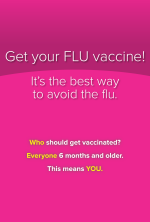Persons Recommended for Seasonal Influenza Vaccination
Everyone 6 months of age and older should get a flu shot every year as soon as the vaccine is available, with rare exceptions.
A yearly flu shot is especially important for people at higher risk of getting seriously ill from the flu. This includes the following people:
- Children younger than 5 years;
- Adults 50 and older;
- Women who are, or who will be, pregnant during flu season;
- American Indians and Alaskan Natives;
- Residents of nursing homes and other chronic care facilities;
- People who have the following medical conditions:
- Neurological and neurodevelopmental conditions [including disorders of the brain, spinal cord, peripheral nerve, and muscle such as cerebral palsy, epilepsy (seizure disorders), stroke, intellectual disability (mental retardation), moderate to severe developmental delay, muscular dystrophy, or spinal cord injury];
- Chronic lung disease [such as chronic obstructive pulmonary disease (COPD) and cystic fibrosis], including asthma;
- Heart disease (such as congenital heart disease, congestive heart failure and coronary artery disease);
- Blood disorders (such as sickle cell disease);
- Endocrine disorders (such as diabetes mellitus);
- Kidney disorders;
- Liver disorders;
- Metabolic disorders (such as inherited metabolic disorders and mitochondrial disorders);
- Weakened immune system due to disease or medication (such as people with HIV or AIDS, or cancer, or those on chronic steroids);
- Children and adolescents (6 months – 18 years old) who are receiving long-term aspirin therapy;
- People who are extremely obese (Body Mass Index, or BMI, of 40 or greater).
Vaccination efforts should also focus on delivering the flu shot to the following people, who live with or care for people at high risk of getting seriously ill from the flu:
- Health care personnel;
- Household contacts and caregivers of children younger than 5 years, and adults 50 years or older, with particular emphasis on vaccinating contacts of children younger than 6 months;
- Household contacts and caregivers of persons with any of the medical conditions noted above, including pregnancy.
